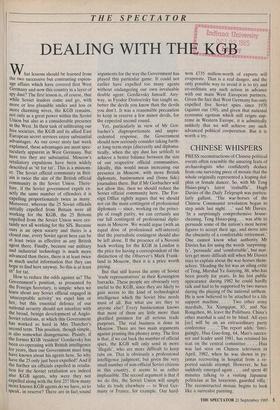THE SPECTATOR
DEALING WITH THE KGB:..„ What lessons should be learned from the two successive but contrasting espion- age affairs which have covered first West Germany and now this country in a layer of spy dust? The first lesson is, of course, that while Soviet leaders come and go, with more or less plausible smiles and less or more charming wives, the KGB remains, not only as a great power within the Soviet Union but also as a considerable presence in the West. In their task of infiltrating our free societies, the KGB and its allied East European secret services enjoy substantial advantages. As our cover story last week explained, these advantages are most spec- tacularly apparent in West Germany. But here too they are substantial. Moscow's retaliatory expulsions have been widely described as 'tit for tat'. This is a misnom- er. The Soviet official community in Brit- ain is twice the size of the British official Community in the Soviet Union. There- fore, if the Soviet government expels ex- actly the same number of offenders it is expelling proportionately twice as many. Moreover, whereas the 25 Soviet officials initially expelled from Britain were all working for the KGB, the 25 Britons expelled from the Soviet Union were cer- tainly not all working for the SIS. Because ours is an open society and theirs is a closed one, every Soviet agent here can be at least twice as effective as any British agent there. Finally, because our military and industrial technology is much more advanced than theirs, there is at least twice as much useful information that they can hope to find here anyway. So this is at least tit for tat.
How to reduce the odds against us? The Government's position, as presented by the Foreign Secretary, is simple: when we learn about any Soviet official engaged in unacceptable activity' we expel him or her, but this essential defence of our national security should not interfere with the broad, benign development of Anglo- Soviet relations, at which this Government has worked so hard in Mrs Thatcher's second term. This position, though simple, is also somewhat disingenuous. Plainly, if the former KGB 'resident' Gordievsky has been co-operating with British intelligence for years, then our Government must long have known about his agents here. So why have the 25 only just been expelled? And if the further six officials expelled in retalia- tion for the ASoviet retaliation are indeed also KGB agents, why were they not expelled along with the first 25? How many more known KGB agents do we have, so to speak, in reserve? There are in fact sound
arguments for the way the Government has played this particular game. It could not earlier have expelled too many agents without endangering our own invaluable double agent: Gordievsky himself. Any- way, as Fyodor Dostoevsky has taught us, better the devils you know than the devils you don't. It was a reasonable precaution to keep in reserve a few minor devils, for the expected second round.
Yet, particularly in view of Mr Gor- bachev's disproportionate and unpre- cedented response, the Government should now seriously consider taking furth- er long-term steps (discreetly and diploma- tically, when the spy dust has settled) to achieve a better balance between the size of our respective official communities. Ideally, this would mean increasing our presence in Moscow, with more British diplomats, businessmen and (bona fide) journalists there. But if Mr Gorbachev will not allow this, then we should reduce the Soviet official community here. The For- eign Office rightly argues that we should not cut the main contingent of professional diplomats — since, working on the princi- ple of rough parity, we can certainly use our full contingent of professional diplo- mats in Moscow. We would argue (with an equal dose of professional self-interest) that the journalistic contingent should also be left alone. If the presence of a Novosti hack working for the KGB in London is the price for having a correspondent of the distinction of the Observer's Mark Frank- land in Moscow, then it is a price worth paying.
But that still leaves the army of Soviet `trade representatives' in their Kensington barracks. These people are obviously very useful to the KGB, since they are likely to gain access to the kind of technological intelligence which the Soviet bloc needs most of all. But what use are they to anyone else? Every businessman knows that most of them are little more than glorified postmen for all serious trade purposes. The real business is done in Moscow. There are two main arguments against pruning this phoney army. The first is that, if we cut back the number of official spies, the KGB will only send in more `illegals', who are more difficult to keep tabs on. That is obviously a professional intelligence judgment; but given the very small number of non-official Soviet citizens in this country, it seems to us rather implausible. The second argument is that if we do this, the Soviet Union will simply take its trade elsewhere — to West Ger- many or France, for example. Our hard-
won £735 million-worth of exports will evaporate. That is a real danger, and the only possible way to avoid it is to try and co-ordinate any such action in advance with our main West European partners. Given the fact that West Germany has only expelled five Soviet spies since 1970 (against our 150), and given that national economic egotism which still reigns sup- reme in Western Europe, it is admittedly unlikely that we will achieve any such advanced political cooperation. But it is worth a try.














































 Previous page
Previous page